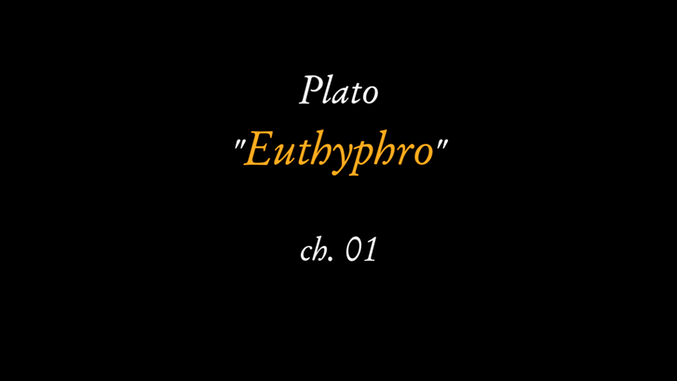• Euthyphro •
• Plato •

Duration: 51 min
Unabridged
Recorded: 2021
Price : $/€ 30
About the Platonic dialogue “Euthyphro”
The young and self-confident diviner Euthyphro (Gr: Εὐθύφρων) meets Socrates (Gr: Σωκράτης) outside the Royal Archway (Gr: Βασιλέως Στοά), the place in ancient Athens, where the King Archon (Gr: Ἄρχων Βασιλεύς) made the preparatory hearings before a case would come to court. Socrates is accused of impiety while Euthyphro prosecutes his father as been responsible for the death of one of Euthyphro's own workers.
This brings up the question of what is piety, which remains unanswered —beyond the philosophical difficulty of exactly defining such terms— as the two men have a different attitude towards it. Socrates needs an all inclusive definition, while Euthyphro, been a diviner, practically relies on his interpretation of religious myth to justify his actions.
The dialogue raises some serious philosophical questions but there's a hidden humorous touch all the way, since we are witnessing a confrontation of a serious and seemingly self-important young know-it-all with a peculiar old man who in his quest for real knowledge plagues his partner with difficult questions until he gets satisfactory answers. These answers, as a matter of fact, never come up when Socrates is involved...
In the end Euthyphro needs to flee, with Socrates remaining behind shouting "helplessly" to him.
A good stepwise analysis of what is happening in this dialogue is written by Andrew G. Sheppard. There's more at Academia.edu.
Plato
Plato (Gr: Πλάτων) doesn’t need an introduction, in case you’d like to refresh your knowledge about his life and work, you can read enough in published books, or online at websites like: Encyclopaedia Britannica, Stanford Encyclopaedia of Philosophy, Wikipedia, Biography.com, or elsewhere.
About the audiobook
For narrating this dialogue there had to be some decisions taken, the most urgent one been on how to impersonate as clearly as feasible the two characters. I've chosen a rather deep and mostly stable voice for the young diviner, as this seemed to me the right impression of his (excessive) self-confidence. This lets also the humour of the situation come up, as the young man does not realise where the questions and reasoning of Socrates are leading him to. For Socrates I've applied a softer tone, as this sounds proper for a person eager to learn from "someone who knows", be it in earnest or a trap for the other party to step in...
 The recording contains the complete unabridged Ancient Greek text of the Platonic Euthyphro. After purchase you will be able to download the zip file, containing both mp3 and m4b formats. The m4b format is bookmarkable and chapterised, divided in parts for convenience when listening or referencing while following the original text.
The recording contains the complete unabridged Ancient Greek text of the Platonic Euthyphro. After purchase you will be able to download the zip file, containing both mp3 and m4b formats. The m4b format is bookmarkable and chapterised, divided in parts for convenience when listening or referencing while following the original text.
You can listen to the beginning of the dialogue, as an audio sample of the present audiobook. Please, click on the play-button below and, if you wish, follow the quoted Ancient Greek, or alternatively watch the video, which is provided with a quick translation in English. Thank you!
ΕΥΘΥΦΡΩΝ (ch. 01) :
ΕΥΘΥΦΡΩΝ: Τί νεώτερον, ὦ Σώκρατες, γέγονεν, ὅτι σὺ τὰς ἐν Λυκείῳ καταλιπὼν διατριβὰς ἐνθάδε νῦν διατρίβεις περὶ τὴν τοῦ βασιλέως στοάν; οὐ γάρ που καὶ σοί γε δίκη τις οὖσα τυγχάνει πρὸς τὸν βασιλέα ὥσπερ ἐμοί.
ΣΩΚΡΑΤΗΣ: Οὔτοι δὴ Ἀθηναῖοί γε, ὦ Εὐθύφρον, δίκην αὐτὴν καλοῦσιν, ἀλλὰ γραφήν.
Ε: Τί φῄς; γραφήν σέ τις, ὡς ἔοικε, γέγραπται; οὐ γὰρ ἐκεῖνό γε καταγνώσομαι, ὡς σὺ ἕτερον.
Σ: Οὐ γὰρ οὖν. – Ε: Ἀλλὰ σὲ ἄλλος; – Σ: Πάνυ γε. – Ε: Τίς οὗτος;
Σ: Οὐδ᾿ αὐτὸς πάνυ τι γιγνώσκω, ὦ Εὐθύφρον, τὸν ἄνδρα· νέος γάρ τίς μοι φαίνεται καὶ ἀγνώς· ὀνομάζουσι μέντοι αὐτόν, ὡς ἐγᾦμαι, Μέλητον. ἔστι δὲ τῶν δήμων Πιτθεύς, εἴ τινα νῷ ἔχεις Πιτθέα Μέλητον οἷον τετανότριχα καὶ οὐ πάνυ εὐγένειον, ἐπίγρυπον δέ.
Ε: Οὐκ ἐννοῶ, ὦ Σώκρατες· ἀλλὰ δὴ τίνα γραφήν σε γέγραπται;
Σ: Ἥντινα; οὐκ ἀγεννῆ, ἔμοιγε δοκεῖ· τὸ γὰρ νέον ὄντα τοσοῦτον πρᾶγμα ἐγνωκέναι οὐ φαῦλόν ἐστιν· ἐκεῖνος γάρ, ὥς φησιν, οἶδε, τίνα τρόπον οἱ νέοι διαφθείρονται καὶ τίνες οἱ διαφθείροντες αὐτούς· καὶ κινδυνεύει σοφός τις εἶναι· καὶ τὴν ἐμὴν ἀμαθίαν κατιδὼν ὡς διαφθείροντος τοὺς ἡλικιώτας αὐτοῦ, ἔρχεται κατηγορήσων μου ὡς πρὸς μητέρα πρὸς τὴν πόλιν. καὶ φαίνεταί μοι τῶν πολιτικῶν μόνος ἄρχεσθαι ὀρθῶς· ὀρθῶς γάρ ἐστι τῶν νέων πρῶτον ἐπιμεληθῆναι, ὅπως ἔσονται ὅ τι ἄριστοι, ὥσπερ γεωργὸν ἀγαθὸν τῶν νέων φυτῶν εἰκὸς πρῶτον ἐπιμεληθῆναι, μετὰ δὲ τοῦτο καὶ τῶν ἄλλων· καὶ δὴ καὶ Μέλητος ἴσως πρῶτον μὲν ἡμᾶς ἐκκαθαίρει τοὺς τῶν νέων τὰς βλάστας διαφθείροντας, ὥς φησιν· ἔπειτα μετὰ τοῦτο δῆλον ὅτι τῶν πρεσβυτέρων ἐπιμεληθεὶς πλείστων καὶ μεγίστων ἀγαθῶν αἴτιος τῇ πόλει γενήσεται, ὥς γε τὸ εἰκὸς ξυμβῆναι ἐκ τοιαύτης ἀρχῆς ἀρξαμένῳ.
